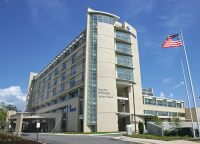Hospital Grants Mercy on Environment
by July 14, 2008 12:00 am 123 views

Northwest Arkansas’ Greenest Office: Mercy Health Systems, Rogers
Patient care is the top priority at Mercy Health Systems, but the environment gets a little TLC of its own at the new 350,000-SF Medical Center at Pinnacle Hills in Rogers.
“One of the core values of the Sisters of Mercy is respect for the Earth,” said Mercy CEO George Flynn. “We wanted to make sure this facility respected that core value.”
From the first moment Mercy began the design process gathering ideas from employees and department directors, green elements came to the forefront as a natural complement to the greater goals for the best patient experience.
Designed by Perkins & Will, an architectural firm based in Atlanta, and guided by NorthStar Management of Fayetteville, a core of designers both in Georgia and locally drove the process.
Digital records, high efficiency systems and a building orientation that minimizes heat absorption while maximizing picturesque views are just a few of the elements of Mercy Health’s $140 million project that earned recognition as the overall winner in the Business Journal’s first “Greenest Office” competition.
“I think it’s rewarding, because one of the design elements or priorities was to try to be as ‘green’ or environmentally friendly as possible,” Flynn said of the honor. “We’re very pleased.”
The most significant benefit to the electronic record keeping is for the patient, as intended. Doctors can input medication and treatment orders directly to the system instead of verbally or in writing, which reduces the risk of errors.
The system will also generate automated alerts to prevent allergic reactions or other negative drug interactions with other medications. Registration and scheduling are streamlined, and less time is lost retrieving and updating hard copies of medical records.
From a green standpoint, though, the winners are Mercy’s budget and the environment.
Flynn said Mercy hopes to save on reduced material usage after converting 399,589 patient records to electronic format.
“There was a learning curve to it that makes it a little less efficient on front end, it’s a little harder than making a quick jot with a pen,” Flynn said. “But the vast majority recognize already the value of e-records and the benefit to patients. When you ask them if they would like to go back, it is a resounding, ‘No.'”
Mercy isn’t “paperless,” though, and has begun a recycling partnership with its document destroyer, Shred-It. From just one week’s worth of paper – 920 pounds – shredded and recycled in May, Shred-It estimated Mercy saved 19 trees, or a rate of nearly 1,000 trees per year.
With patient care paramount throughout the process, if a green feature satisfied that requirement and could be incorporated in a cost-effective way, it was.
Mercy even recycled its old furniture with a 60 percent ratio of reused, 40 percent new.
Most of the new furniture adorns the patient, visitor and some office space areas while the older furnishings were placed in “off-stage” parts of the hospital.
Elements that cost more up front – but are expected to pay off in the long run – are in the energy plant and mechanical equipment design.
“They will have financial payback for us,” Flynn said.
The initial estimates were that savings would amount to 40 percent of Mercy’s previous utility costs, at around $1.80 per SF versus $3 per SF.
Mercy was able to secure a beneficial cost rate on utilities as a result of installing the more efficient systems. By reducing its consumption as one of the largest users on the grid, Mercy allows the utility companies to better serve the entire community with reliable power during peak usage periods.
Providing enough power is no small concern in growing Northwest Arkansas. In the past, hot summers have seen utilities requests from the biggest consumers, such as Tyson Foods Inc., to reduce usage at peak times.
Mercy has only been operating since March, so it is still pretty early to determine how well the systems are functioning. Flynn reports early costs are running 20 percent to 30 percent less than the previous hospital, but no data are yet available for how the system will perform during hot summers and chilly winters.
Preserving the natural beauty of unobstructed views of Pinnacle Hills affected the building orientation to drive growth away from the forested bluffs and to provide visitors, patients and employees with the most tranquil sights. Patient satisfaction scores have gone up since Mercy’s move.
“We hear comments every day about how much nicer it is,” Flynn said. “Part of that is in the clinical care areas, where we’ve taken the design features to create a healing, peaceful environment.”
(See more of the greenest offices in Northwest Arkansas by clicking here.)
